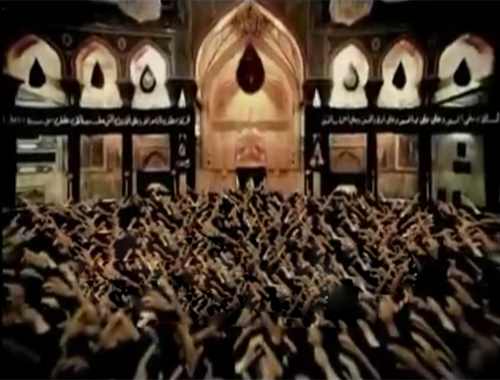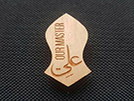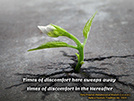Articles
'Faith' in the Holy Qur'an
- Details
- Hits: 2526
‘Faith’ in the Holy Qur’an
Introduction
The main essence of all Divine Religions of deliverance is “Calling to Faith”. From the inception of any religion the aim of the prophets was to establish the solid structure of faith in the heart of people, whose bases are founded on the individual’s God-seeking nature and lead to his eternal happiness.
As faith begins with the individual’s sincere admission and submission to the commands of the monotheistic religion, it is like a sprout that blooms in the heart; each of the divine religions has tried, within certain frameworks which are divine in their origin, to grow this sprout to a fruitful tree, one “whose trunk is fixed but its branch is in heaven”.
“Belief in the unseen” is the first constituent of the rightly guided one, which has been stated at the beginning of the Qur’an. From the viewpoint of the Qur’an this attribute is always accompanied by awareness, commitment and practice, and is the origin of light, confidence, creativity and discernment for both the individual and society. Before elaborating on its characteristics and impacts, a thorough definition of faith and its position in the Qur’an would be necessary.
Faith
Man’s endeavour and work, which is the wisdom of his existence, has a beginning or a springboard, that is belief. Belief is to accept and commit oneself to that which brings in its wake work and endeavour and leads to happiness. Without faith every work or endeavour will be impermanent, fruitless and every wayfarer will be hopeless and cheerless, and life will finally be still, dull and motionless. The importance, the Holy Qur’an gives to the believer and its emphasis on belief as the highest value and man’s supreme attribute stem only from this reality. Let us consider the principal Islamic values implied in the following verse and the position of faith at the top of this hierarchy.
لَّيْسَ الْبِرَّ أَن تُوَلُّواْ وُجُوهَكُمْ قِبَلَ الْمَشْرِقِ وَالْمَغْرِبِ وَلَكِنَّ الْبِرَّ مَنْ آمَنَ بِاللّهِ وَالْيَوْمِ الآخِرِ وَالْمَلآئِكَةِ وَالْكِتَابِ وَالنَّبِيِّينَ وَآتَى الْمَالَ عَلَى حُبِّهِ ذَوِي الْقُرْبَى وَالْيَتَامَى وَالْمَسَاكِينَ وَابْنَ السَّبِيلِ وَالسَّآئِلِينَ وَفِي الرِّقَابِ وَأَقَامَ الصَّلاةَ وَآتَى الزَّكَاةَ وَالْمُوفُونَ بِعَهْدِهِمْ إِذَا عَاهَدُواْ وَالصَّابِرِينَ فِي الْبَأْسَاء والضَّرَّاء وَحِينَ الْبَأْسِ أُولَئِكَ الَّذِينَ صَدَقُوآ وَأُولَئِكَ هُمُ الْمُتَّقُونَ
“Piety is not to turn your faces to the east or the west; rather, piety is [personified by] those who have faith in Allah and the Last Day, the angels, the Book, and the prophets, and who give their wealth, for the love of Him, to the relatives, the orphans, and the needy, the traveller and the beggars, and for [the freeing of] the slaves, and maintain the prayer and give the zakat, and those who fulfill their covenants, when they pledge themselves, and those who are patient in stress and distress, and in the heat of battle. They are the ones who are true[ to their covenant], and it is they who are the Godwary.”[1]
For this reason, in answering People of the Book who believed that being a Jewish or Christian is the only way of salvation, the Qur’an raises the Islamic faith and states that it is the cause for attaining the straight way:
قُولُواْ آمَنَّا بِاللّهِ وَمَآ أُنزِلَ إِلَيْنَا وَمَا أُنزِلَ إِلَى إِبْرَاهِيمَ وَإِسْمَاعِيلَ وَإِسْحَقَ وَيَعْقُوبَ وَالأسْبَاطِ وَمَا أُوتِيَ مُوسَى وَعِيسَى وَمَا أُوتِيَ النَّبِيُّونَ مِن رَّبِّهِمْ لاَ نُفَرِّقُ بَيْنَ أَحَدٍ مِّنْهُمْ وَنَحْنُ لَهُ مُسْلِمُونَ * فَإِنْ آمَنُواْ بِمِثْلِ مَآ آمَنتُم بِهِ فَقَدِ اهْتَدَواْ
“Say, ‘We have faith in Allah, and that which has been sent down to us, and that which was sent down to Abraham, Ishmael, Isaac, Jacob and the Tribes, and that which Moses and Jesus were given, and that which the prophets were given from their Lord; we make no distinction between any of them, and to Him do we submit.’ So if they believe in the like of what you believe in, then they are certainly guided.”[2]
Faith Based on Knowledge
Reflecting on the foregoing verse the following issues might be concluded:
1. Having faith in the religious principles and foundations is one of the important characteristics of the Apostle of God and his true followers. This is so significant that there is special emphasis on it in the Qur’an.
آمَنَ الرَّسُولُ بِمَا أُنزِلَ إِلَيْهِ مِن رَّبِّهِ وَالْمُؤْمِنُونَ كُلٌّ آمَنَ بِاللّهِ وَمَلآئِكَتِهِ وَكُتُبِهِ وَرُسُلِهِ لاَ نُفَرِّقُ بَيْنَ أَحَدٍ مِّن رُّسُلِهِ وَقَالُواْ سَمِعْنَا وَأَطَعْنَا غُفْرَانَكَ رَبَّنَا وَإِلَيْكَ الْمَصِيرُ
“The Apostle has faith in what has been sent down to him from his Lord, and all the faithful. Each [of them] has faith in Allah, His angels, His scriptures and His apostles; [They declare,]We make no distinction between any of His apostles. And they say, ‘We hear and obey. Our Lord, forgive us, and toward You is the return.”[3]
2. However, faith is based on awareness, consciousness and understanding; it is not blind and mimetic. It is this characteristic that distinguishes one’s faith from vulgar love and devotion that is often vain, futile and transitory.
In the following verses, a manifest sign of this awareness can be observed:
إِنَّ فِي خَلْقِ السَّمَاوَاتِ وَالأَرْضِ وَاخْتِلاَفِ اللَّيْلِ وَالنَّهَارِ لآيَاتٍ لِّأُوْلِي الألْبَابِ * الَّذِينَ يَذْكُرُونَ اللّهَ قِيَامًا وَقُعُودًا وَعَلَىَ جُنُوبِهِمْ وَيَتَفَكَّرُونَ فِي خَلْقِ السَّمَاوَاتِ وَالأَرْضِ رَبَّنَآ مَا خَلَقْتَ هَذا بَاطِلاً سُبْحَانَكَ فَقِنَا عَذَابَ النَّارِ * رَبَّنَا إِنَّكَ مَن تُدْخِلِ النَّارَ فَقَدْ أَخْزَيْتَهُ وَمَا لِلظَّالِمِينَ مِنْ أَنصَارٍ * رَّبَّنَا إِنَّنَآ سَمِعْنَا مُنَادِيًا يُنَادِي لِلإِيمَانِ أَنْ آمِنُواْ بِرَبِّكُمْ فَآمَنَّا
“Indeed in the creation of the heavens and the earth and the alternation of night and day, there are signs for those who possess intellects. Those who remember Allah standing, sitting, and lying on their sides, and reflect on the creation of the heavens and the earth [and say], ‘Our Lord, You have not created this in vain! Immaculate are You! Save us from the punishment of the Fire. Our Lord, whoever that You make enter the Fire will surely have been disgraced by You, and the wrongdoers will have no helpers. Our Lord, we have indeed heard a summoner calling to faith, declaring, “Have faith in your Lord!” So we believed.”[4]
3. If awareness, understanding, and argument are not intellectual, then faith will change into foolish prejudice and dogmatism, and the manifest path of truth and guidance will be shut before the human beings. Therefore, the Qur’an strongly condemns and criticizes the mimetic and prejudiced faith of the unbelievers in their flimsy thoughts.
Consider the meaningful tone of the following verse:
وَإِذَا قِيلَ لَهُمْ تَعَالَوْاْ إِلَى مَا أَنزَلَ اللّهُ وَإِلَى الرَّسُولِ قَالُواْ حَسْبُنَا مَا وَجَدْنَا عَلَيْهِ آبَاءنَا أَوَلَوْ كَانَ آبَاؤُهُمْ لاَ يَعْلَمُونَ شَيْئًا وَلاَ يَهْتَدُونَ
“And when they are told, ‘Come to what Allah has sent down and [come] to the Apostle,’ they say, ‘Sufficient for us is what we have found our fathers following.’ What, even if their fathers did not know anything and were not guided?!”[5]
The Productive Faith Accompanied by Practical Commitment
Is faith as a completely intellectual acceptance sufficient? Or is it significant due to its being “effective” in life and “practically generative”? The Qur’an places faith along with practice and considers it a motive for “traversing the straight path toward the aim”. Numerous Qur’anic verses indicate that rewards in this world and the Hereafter simply follow from “the faith accompanied by practice”. Consider the following verses of the Holy Qur’an.
وَإِذَا قِيلَ لَهُمْ تَعَالَوْاْ إِلَى مَا أَنزَلَ اللّهُ وَإِلَى الرَّسُولِ قَالُواْ حَسْبُنَا مَا وَجَدْنَا عَلَيْهِ آبَاءنَا أَوَلَوْ كَانَ آبَاؤُهُمْ لاَ يَعْلَمُو يَا أَيُّهَا الَّذِينَ آمَنُوا ارْكَعُوا وَاسْجُدُوا وَاعْبُدُوا رَبَّكُمْ وَافْعَلُوا الْخَيْرَ لَعَلَّكُمْ تُفْلِحُونَ * وَجَاهِدُوا فِي اللَّهِ حَقَّ جِهَادِهِ هُوَ اجْتَبَاكُمْ وَمَا جَعَلَ عَلَيْكُمْ فِي الدِّينِ مِنْ حَرَجٍ مِّلَّةَ أَبِيكُمْ إِبْرَاهِيمَ هُوَ سَمَّاكُمُ الْمُسْلِمينَ مِن قَبْلُ وَفِي هَذَا لِيَكُونَ الرَّسُولُ شَهِيدًا عَلَيْكُمْ وَتَكُونُوا شُهَدَاء عَلَى النَّاسِ فَأَقِيمُوا الصَّلَاةَ وَآتُوا الزَّكَاةَ وَاعْتَصِمُوا بِاللَّهِ هُوَ مَوْلَاكُمْ فَنِعْمَ الْمَوْلَى وَنِعْمَ النَّصِيرُنَ شَيْئًا وَلاَ يَهْتَدُونَ
“O, you who have faith! Bow down and prostrate yourselves, and worship your Lord, and do well, so that you may be felicitous. And wage jihad for the sake of Allah, a jihad which is worthy of Him. He has chosen you and has not placed for you any obstacle in the religion, the faith of your father, Abraham. He named you ‘Muslims’ before, and in this, so that the Apostle may be a witness to you, and that you may be witnesses to mankind. So maintain the prayer, give the zakat, and hold fast to Allah. He is your master- an excellent master and an excellent helper.”[6]
In these verses the most important characteristics of religious faith, namely victory and felicity, being chosen, leadership and guidance of human beings and finally enjoying God’s support are conditioned by the faith associated with practice and action.
The following verse (from surat al-Anfal) reminds us of the deeds derived from faith, and specifies the role of faith and practice together in the Islamic society.
إِنَّ الَّذِينَ آمَنُواْ وَهَاجَرُواْ وَجَاهَدُواْ بِأَمْوَالِهِمْ وَأَنفُسِهِمْ فِي سَبِيلِ اللّهِ وَالَّذِينَ آوَواْ وَّنَصَرُواْ أُوْلَئِكَ بَعْضُهُمْ أَوْلِيَاء بَعْضٍ وَالَّذِينَ آمَنُواْ وَلَمْ يُهَاجِرُواْ مَا لَكُم مِّن وَلاَيَتِهِم مِّن شَيْءٍ حَتَّى يُهَاجِرُواْ
“Indeed those who have believed and migrated and waged jihad with their possessions and persons in the way of Allah, and those who gave [them] shelter and help- they are heirs of one another. As for those who have believed but did not migrate, you have no heirdom in relation to them whatsoever until they migrate.”[7]
Faith and Loyalty to Commitments
According to the previous verses, true faith is accompanied by commitment. As for those who care for their own benefit only, they do not see the religious responsibilities as necessary commitments. Rather, they are loyal to these commitments so long as they do not conflict with their personal benefits. Otherwise they neglect them indifferently.
The Qur’an clearly regards those who perhaps store a bit of faith in their hearts for the days of distress as faithless. As to felicity, salvation, victory and superiority which are God’s promises to believers, they are bestowed upon those who are always and ever loyal and committed to religious obligations.
The following verses are an illuminative voice of the Qur’an:
لَقَدْ أَنزَلْنَا آيَاتٍ مُّبَيِّنَاتٍ وَاللَّهُ يَهْدِي مَن يَشَاء إِلَى صِرَاطٍ مُّسْتَقِيمٍ * وَيَقُولُونَ آمَنَّا بِاللَّهِ وَبِالرَّسُولِ وَأَطَعْنَا ثُمَّ يَتَوَلَّى فَرِيقٌ مِّنْهُم مِّن بَعْدِ ذَلِكَ وَمَا أُوْلَئِكَ بِالْمُؤْمِنِينَ * وَإِذَا دُعُوا إِلَى اللَّهِ وَرَسُولِهِ لِيَحْكُمَ بَيْنَهُمْ إِذَا فَرِيقٌ مِّنْهُم مُّعْرِضُونَ * وَإِن يَكُن لَّهُمُ الْحَقُّ يَأْتُوا إِلَيْهِ مُذْعِنِينَ * أَفِي قُلُوبِهِم مَّرَضٌ أَمِ ارْتَابُوا أَمْ يَخَافُونَ أَن يَحِيفَ اللَّهُ عَلَيْهِمْ وَرَسُولُهُ بَلْ أُوْلَئِكَ هُمُ الظَّالِمُونَ * إِنَّمَا كَانَ قَوْلَ الْمُؤْمِنِينَ إِذَا دُعُوا إِلَى اللَّهِ وَرَسُولِهِ لِيَحْكُمَ بَيْنَهُمْ أَن يَقُولُوا سَمِعْنَا وَأَطَعْنَا وَأُوْلَئِكَ هُمُ الْمُفْلِحُونَ * وَمَن يُطِعِ اللَّهَ وَرَسُولَهُ وَيَخْشَ اللَّهَ وَيَتَّقْهِ فَأُوْلَئِكَ هُمُ الْفَائِزُونَ
“Certainly We have sent down manifest signs, and Allah guides whomever He wishes to a straight path. They say, ‘We have faith in Allah and His Apostle, and we obey.’ Then after that a part of them refuse to comply, and they do not have faith. When they are summoned to Allah and His Apostle that He may judge between them, behold, a part of them turn aside. But if justice be on their side, they come compliantly to him. Is there a sickness in their hearts? Or do they doubt or fear that Allah and His Apostle will be unjust to them? Rather it is they who are the wrongdoers. All the response of the faithful, when they are summoned to Allah and His Apostle that He may judge between them, is to say, ‘We hear and obey.’ It is they who are the felicitous.”[8]
Finally, in the following two verses the pleasant promise of “Divine Caliphate”, political dominance over the world and establishment of the ideal Islamic society is given to those believers who associate their beliefs with proper and good deeds.
وَعَدَ اللَّهُ الَّذِينَ آمَنُوا مِنكُمْ وَعَمِلُوا الصَّالِحَاتِ لَيَسْتَخْلِفَنَّهُم فِي الْأَرْضِ كَمَا اسْتَخْلَفَ الَّذِينَ مِن قَبْلِهِمْ وَلَيُمَكِّنَنَّ لَهُمْ دِينَهُمُ الَّذِي ارْتَضَى لَهُمْ وَلَيُبَدِّلَنَّهُم مِّن بَعْدِ خَوْفِهِمْ أَمْنًا يَعْبُدُونَنِي لَا يُشْرِكُونَ بِي شَيْئًا
“Allah has promised those of you who have faith and do righteous deeds that he will surely make them successors in the earth, just as He made those who were before them successors, and He will surely establish for them their religion which He has approved for them, and that He will surely change their state to security after fear, while they worship Me, not ascribing any partners to Me.”[9]
The Promises
What should one do in order to attain perfect happiness?
1. He should know the aim and the way that leads to happiness (guidance).
2. He should remove the dark veil of ignorance, arrogance, illusion and whatever may cover the pearl of his insight and wisdom and take away his vision and understanding, to let the light of truth shine into his heart (light).
3. In his long journey to happiness he should abandon all fears and internal temptations which are stronger and more destructive than internal deterrent causes (confidence and security).
4. He should have confidence in his endeavours and hope in their good end.
5. He should know that his errors and mistakes are redeemable and pardonable (forgiveness and mercy).
6. He should depend on definite support and assistance in all cases.
7. In face of enemies and hostilities he should trust the help and support of a power superior to human power.
8. He should be higher and stronger than the opposing sides.
9. He should defeat the enemies of his way and aim who stand against and frustrate his endeavours.
10. He should finally overcome all the difficulties, pressures, fetters and obstacles, and achieve his aim and purpose (victory and salvation).
11. In all cases, both at home and on the way, he should make use of the resources which are provided for man in this world.
Finally at the end of his life and the conclusion of his endeavours he would meet a good reward and have rest in the paradise of bounty and peace.
Now let us listen to the discourse of the holy Qur’an, which promises all of these gifts to the possessors of belief—a belief that brings about commitment and is accompanied by practice.
1. The Guidance
إِنَّ الَّذِينَ آمَنُواْ وَعَمِلُواْ الصَّالِحَاتِ يَهْدِيهِمْ رَبُّهُمْ بِإِيمَانِهِمْ تَجْرِي مِن تَحْتِهِمُ الأَنْهَارُ فِي جَنَّاتِ النَّعِيمِ
“Indeed those who have faith and do righteous deeds, their Lord guides them by the means of their faith. Streams will run for them in gardens of bliss.”[10]
يَا أَيُّهَا النَّاسُ قَدْ جَاءكُم بُرْهَانٌ مِّن رَّبِّكُمْ وَأَنزَلْنَا إِلَيْكُمْ نُورًا مُّبِينًا، فَأَمَّا الَّذِينَ آمَنُواْ بِاللّهِ وَاعْتَصَمُواْ بِهِ فَسَيُدْخِلُهُمْ فِي رَحْمَةٍ مِّنْهُ وَفَضْلٍ وَيَهْدِيهِمْ إِلَيْهِ صِرَاطًا مُّسْتَقِيمًا
“O mankind! Certainly a proof has come to you from your Lord, and We have sent down to you a manifest light. As for those who have faith in Allah, and hold fast to Him, He will admit them to His mercy and grace, and He will guide them on a straight path to Him.”[11]
وَالَّذِينَ جَاهَدُوا فِينَا لَنَهْدِيَنَّهُمْ سُبُلَنَا وَإِنَّ اللَّهَ لَمَعَ الْمُحْسِنِينَ
“As for those who strive in Us, We shall surely guide them in Our ways, and Allah is indeed with the virtuous.”[12]
2. The Light
اللّهُ وَلِيُّ الَّذِينَ آمَنُواْ يُخْرِجُهُم مِّنَ الظُّلُمَاتِ إِلَى النُّوُرِ وَالَّذِينَ كَفَرُواْ أَوْلِيَآؤُهُمُ الطَّاغُوتُ يُخْرِجُونَهُم مِّنَ النُّورِ إِلَى الظُّلُمَاتِ أُوْلَئِكَ أَصْحَابُ النَّارِ هُمْ فِيهَا خَالِدُونَ
“Allah is the Master of the faithful. He brings them out of darkness into light. As for the faithless, their patrons are the Rebels, who drive them out of light into darkness. They shall be the inmates of the Fire, and they shall remain in it [forever].”[13]
يَا أَيُّهَا الَّذِينَ آمَنُوا اذْكُرُوا اللَّهَ ذِكْرًا كَثِيرًا * وَسَبِّحُوهُ بُكْرَةً وَأَصِيلا ً* هُوَ الَّذِي يُصَلِّي عَلَيْكُمْ وَمَلَائِكَتُهُ لِيُخْرِجَكُم مِّنَ الظُّلُمَاتِ إِلَى النُّورِ
“O you who have faith! Remember Allah with frequent remembrance, and glorify Him morning and evening. It is He who blesses you, and so do His angels, that He may bring you out from darkness into light.”[14]
يَا أَيُّهَا الَّذِينَ آمَنُوا اتَّقُوا اللَّهَ وَآمِنُوا بِرَسُولِهِ يُؤْتِكُمْ كِفْلَيْنِ مِن رَّحْمَتِهِ وَيَجْعَل لَّكُمْ نُورًا تَمْشُونَ بِهِ
“O you who have faith! Be wary of Allah and have faith in His Apostle. He will grant you double share of His mercy and give you a light to walk by.”[15]
3. Tranquillity, Rest and Security
One of the most important characteristics of the believers is deliverance from disturbance, anxiety and temptation. For the Qur’an promises them the extremely valuable spiritual state:
الَّذِينَ آمَنُواْ وَتَطْمَئِنُّ قُلُوبُهُم بِذِكْرِ اللّهِ أَلاَ بِذِكْرِ اللّهِ تَطْمَئِنُّ الْقُلُوبُ، الَّذِينَ آمَنُواْ وَعَمِلُواْ الصَّالِحَاتِ طُوبَى لَهُمْ وَحُسْنُ مَآبٍ
“Those who have faith, and whose hearts find rest in remembrance of Allah. Look! The hearts find rest in Allah’s remembrance! Those who have faith and do righteous deeds happy are they and good is their [ultimate] destination.”[16]
Abraham(p.b.u.h) mentioned the same truth to the wandering polytheists of his time who because of the lack of a certain and reasonable ideology could not have tranquil and peaceful hearts. He took pride in his spiritual tranquillity and inner security which is derived from firmly rooted faith.
وَحَآجَّهُ قَوْمُهُ قَالَ أَتُحَاجُّونِّي فِي اللّهِ وَقَدْ هَدَانِ وَلاَ أَخَافُ مَا تُشْرِكُونَ بِهِ إِلاَّ أَن يَشَاء رَبِّي شَيْئًا وَسِعَ رَبِّي كُلَّ شَيْءٍ عِلْمًا أَفَلاَ تَتَذَكَّرُونَ * وَكَيْفَ أَخَافُ مَا أَشْرَكْتُمْ وَلاَ تَخَافُونَ أَنَّكُمْ أَشْرَكْتُم بِاللّهِ مَا لَمْ يُنَزِّلْ بِهِ عَلَيْكُمْ سُلْطَانًا فَأَيُّ الْفَرِيقَيْنِ أَحَقُّ بِالأَمْنِ إِن كُنتُمْ تَعْلَمُونَ * الَّذِينَ آمَنُواْ وَلَمْ يَلْبِسُواْ إِيمَانَهُم بِظُلْمٍ أُوْلَئِكَ لَهُمُ الأَمْنُ وَهُم مُّهْتَدُونَ
“His people argued with him. He said, ‘Do you argue with me concerning Allah, while He has guided me for certain? I do not fear what you ascribe to Him as [His] partners, excepting anything that my Lord may wish. My Lord embraces all things in [His] knowledge. Will you not then take admonition? How could I fear what you ascribe [to Him] as[His] partners, when you do not fear ascribing to Allah partners for which He has not sent down any authority to you? So [tell me,] which of the two sides has a greater right to safety, if you know? Those who have faith and do not taint their faith with wrongdoing for such there shall be safety, and they are the [rightly] guided.”[17]
4. Fruitfulness
The believer knows that each of his steps brings him closer to the goal, his efforts would have a good positive effect, his least attempt will not be wasted, and his activities are generally fruitful and useful.
وَمَا جَعَلْنَا الْقِبْلَةَ الَّتِي كُنتَ عَلَيْهَا إِلاَّ لِنَعْلَمَ مَن يَتَّبِعُ الرَّسُولَ مِمَّن يَنقَلِبُ عَلَى عَقِبَيْهِ وَإِن كَانَتْ لَكَبِيرَةً إِلاَّ عَلَى الَّذِينَ هَدَى اللّهُ وَمَا كَانَ اللّهُ لِيُضِيعَ إِيمَانَكُمْ إِنَّ اللّهَ بِالنَّاسِ لَرَؤُوفٌ رَّحِيمٌ
“And We did not appoint the qiblah you were following but that We may ascertain those who follow the Apostle from those who turn back on their heels. It was indeed a hard thing except for those whom Allah has guided. And Allah would not let your prayers go to waste. Indeed Allah is most kind and merciful to mankind.”[18]
فَمَن يَعْمَلْ مِنَ الصَّالِحَاتِ وَهُوَ مُؤْمِنٌ فَلَا كُفْرَانَ لِسَعْيِهِ وَإِنَّا لَهُ كَاتِبُونَ
“Whoever does righteous deeds, should he be faithful, his endeavor shall not go unappreciated, and We will indeed write it for him.”[19]
--------------------------------------------------------------------------------
[1]. 2: 177
[2]. 2: 136:137
[3]. 2:285
[4]. 3:190-193
[5]. 5:104
[6]. 22:77:78
[7]. 8:72
[8]. 24:46-52
[9]. 24:55
[10]. 10:9
[11]. 4:174-175
[12]. 29:69
[13]. 2:257
[14]. 33:41-43
[15]. 57:28
[16]. 13:28-29
[17]. 6:80-82
[18]. 2:143
[19]. 21:94










